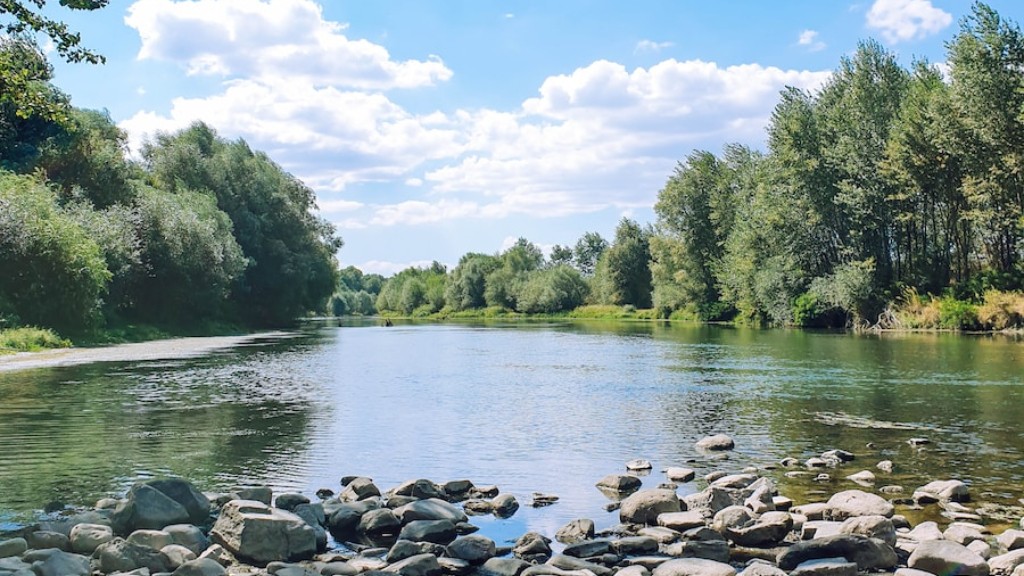You are likely asking yourself, “Can you get sick from drinking the Nile River?” Well, the answer is yes and no. There are definitely instances in which drinking water from the Nile River could make you ill, and there are other cases in which the water is perfectly fine. All depends on where you are obtaining the river’s water, as well as when and under what circumstances.
To understand what potential illnesses one could contract from the Nile River, we must first look at its composition. The Nile River is comprised of both living and non-living organisms that range from microscopic to larger than the human eye can see. These range from bacteria and viruses to plankton, freshwater snails and aquatic vegetation. Some of these organisms are considered non-harmful to the human body and others can cause serious illnesses and infections.
The prevalence of infectious microorganisms in the Nile River depends upon the location and its specific environmental conditions. High levels of pollutants, such as raw sewage, as well as other contaminants, increase the concentration of potentially harmful microorganisms. On the other hand, outflows of natural spring water, waterfalls or rainwater can contribute to the dilution of a location’s pollution.
To ensure the water’s safety, the Egyptian Ministry of Health has been performing regular water quality tests in order to monitor both the physical, chemical and microbial composition. With the help of the World Health Organization (WHO), the Egyptian Ministry of Health has set out standards in regards to the quality and safety of the drinking water from the Nile River. Drinking water from the Nile River can be safe as long as the Ministry of Health has deemed it to meet their standards and does not contain high levels of pollutants, chemicals or other toxins.
According to experts, there are a few illnesses that could be contracted from the Nile waters; this includes diarrheal diseases, typhoid, cholera, hepatitis A and schistosomiasis. Diarrheal diseases, such as cholera, are caused by the ingestion of fecal matter that is not sanitized or properly processed and can be contracted from the poor quality of water that may be found in the Nile River. In addition, Typhoid, Hepatitis A and Schistosomiasis are all caused by ingesting bacteria, fungus or parasites that are commonly found in the river’s water.
So even though it is possible to fall ill from drinking water from the Nile River, this can be prevented by exercising caution when consuming the waters. Furthermore, with the help of the Egyptian Ministry of Health and the WHO, the river’s water is regularly monitored and treated in order to preserve a safe drinking environment.
Understanding Typhoid
Typhoid is an illness that can be contracted from contaminated drinking water, particularly the waters of the Nile. Typhoid is a bacterial infection that, if left untreated, can cause serious problems and can even be fatal. It is a systemic disease, meaning that it affects the entire body and can cause various symptoms such as fever, abdominal pain, headaches, and a rash. In some cases, it can even cause swelling in the gallbladder and, in rare cases, gastrointestinal bleeding.
It is estimated that more than 11 million people worldwide suffer from Typhoid every year, making it a serious public health issue. This can be particularly concerning for those living in the vicinity of the Nile River, as contaminated water from the river can be a potential source of transmission.
However, the risk of contracting Typhoid can be greatly reduced with proper hygiene and disinfection of water. Drinking boiled or treated water, as well as washing hands frequently and properly cooking food are all important steps in preventing the spread of Typhoid. With proper sanitation and hygiene, the risk of Typhoid can be greatly reduced.
Hepatitis A Prevalence
Another illness that could be contracted from the Nile River is Hepatitis A, a contagious virus that causes inflammation of the liver. It is estimated that around 6 million people worldwide suffer from Hepatitis A, with Egypt having one of the highest reported cases in the world.
The symptoms of Hepatitis A can vary depending on the severity of the infection but usually include fever, fatigue, loss of appetite, abdominal pain and dark colored urine. In some cases, it can cause loss of appetite, nausea, vomiting and jaundice.
Hepatitis A can typically be prevented by proper hygiene and sanitation, however, in some cases, it can also be transmitted through contaminated water. As such, it is important to avoid drinking untreated water from the Nile River in order to prevent infection. Cleaning and cooking food properly, as well as regularly washing hands are a few basic hygiene precautionary steps that can help prevent the spread of the virus.
Schistosomiasis Outbreaks
Schistosomiasis, a parasitic infection caused by fluke worms, has become increasingly more common in the Nile Waters, particularly in areas where the river is crowded with boats and used for recreational activities. The disease is caused by the larvae of the fluke worms which can be found in certain species of freshwater snails. These larvae then enter the human body through the skin.
Schistosomiasis can cause severe damage to the human body, leading to chronic inflammation, fibrosis and other problems. It can also lead to chronic illness and complications in both adults and children.
In order to prevent schistosomiasis outbreaks, it is important to reduce the population of freshwater snails. This can be achieved by improving water quality, reducing sewage pollution and using chemical molluscicides to reduce the snail population.
Determining Drinking Water Safety
It is important to note that the safety of water in the Nile River can change drastically depending on location and environmental conditions. In order to determine whether a location’s water is safe to drink, it is important to pay attention to the local news, including water quality tests, and practice safe hygiene such as washing hands and avoiding swimming in the river.
In addition, it is important to exercise caution and always consult an expert before drinking water from the Nile, especially after a heavy rainfall, as these conditions can increase the risk of contracting diseases from the river.
Modern Water Treatment Practices
In an effort to improve water quality from the Nile River and protect human health, water treatment systems have been implemented in many areas of the river. This includes purification systems that filter out the bacteria, viruses and other contaminants found in the water, as well as disinfection systems that kill the remaining pathogens.
These systems use a variety of treatment methods, including reverse osmosis, ultraviolet light, ozone, chlorination and distillation, in order to effectively eliminate pathogens, as well as any other compounds that may be harmful to human health.
It is important to note, however, that modern water treatment systems may not be enough to guarantee human safety. In order to be safe, it is always important to exercise caution and be aware of the conditions of the water prior to drinking it.
Preventing Diarrheal Diseases
Diarrheal diseases, such as cholera, are illnesses that are typically contracted from contaminated food and water. In the case of drinking water from the Nile River, caution is strongly advised, as the river is at risk of contamination from sewage, industrial runoff and other sources.
In order to reduce the risk of contracting diarrheal diseases from the river, it is important to practice proper hygiene and to drink only treated water. Boiling the water and adding bleach or iodine can also help to reduce the risk, and in addition, avoiding uncooked food and unpasteurized milk can help prevent infections.
Furthermore, individuals who are planning to swim in the Nile River should take the necessary precautions, such as showering right away and keeping cuts or scratches covered.
Treating Existing Illnesses
If one does contract an illness from the Nile River, it is important to seek help promptly. The symptoms of many of the illnesses contracted from the river, such as those described previously, can become more severe if proper treatment is not provided.
In cases of diarrheal illnesses or cholera, prompt medical help is essential in order to reduce the risk of dehydration, malnutrition and other complications. Furthermore, should one experience any of the symptoms of a contagious illness, such as fever, abdominal pain or fatigue, even if the water consumption was not from the Nile River, it is important to seek medical attention.
In extreme cases, infections caused by the Nile River can become life-threatening, so it is important to take the necessary precautions to ensure human safety, such as avoiding contact from the river’s water and consistently practicing proper hygiene.





